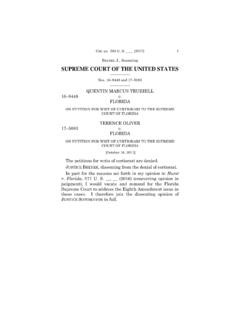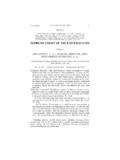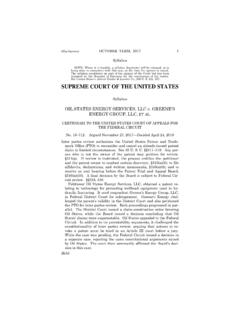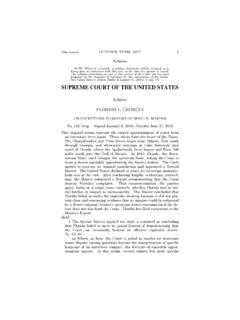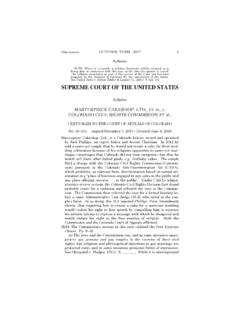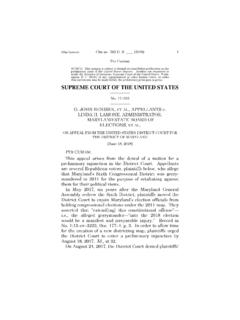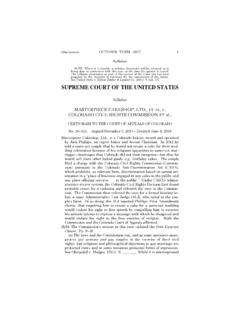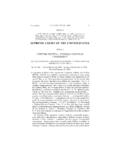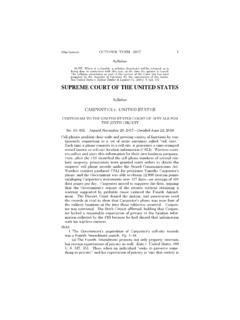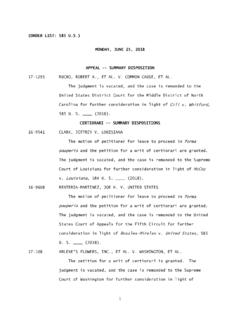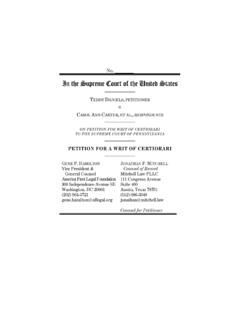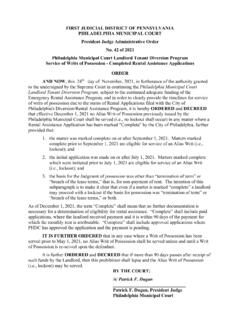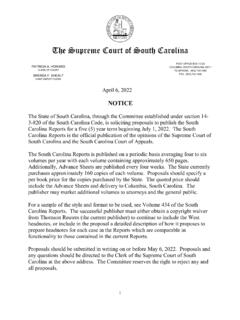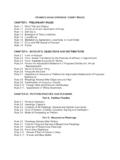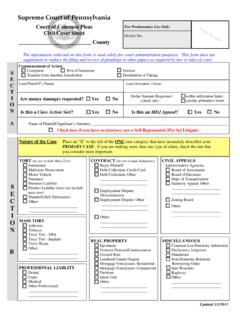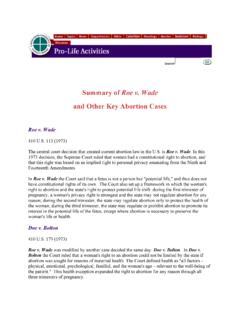Transcription of SUPREME COURT OF THE UNITED STATES
1 (Slip Opinion) OCTOBER TERM, 2021 1. Syllabus NOTE: Where it is feasible, a syllabus (headnote) will be released, as is being done in connection with this case, at the time the opinion is issued. The syllabus constitutes no part of the opinion of the COURT but has been prepared by the Reporter of Decisions for the convenience of the reader. See UNITED STATES v. Detroit Timber & Lumber Co., 200 U. S. 321, 337. SUPREME COURT OF THE UNITED STATES . Syllabus FEDERAL ELECTION COMMISSION v. TED CRUZ FOR. SENATE ET AL. APPEAL FROM THE UNITED STATES DISTRICT COURT FOR THE. DISTRICT OF COLUMBIA. No. 21 12. Argued January 19, 2022 Decided May 16, 2022. During his 2018 Senate reelection campaign and consistent with federal law, see 11 CFR ; 52 U. S. C. 30101(9)(A)(i), appellee Ted Cruz loaned $260,000 to his campaign committee, Ted Cruz for Senate (Committee).
2 To repay these and other campaign debts, campaigns may continue to receive contributions after election day. See 11 CFR. (b)(3)(i). Section 304 of the Bipartisan Campaign Reform Act of 2002 (BCRA) restricts the use of post-election contributions by limiting the amount that a candidate may be repaid from such funds to $250,000. 52 U. S. C. 30116(j). Relevant here, the Federal Election Commission (FEC) has promulgated regulations establishing three rules to implement that limitation: First, a campaign may repay up to $250,000 in candidate loans using contributions made at any time.. 11 CFR (a). Second, to the extent the loans exceed $250,000, a campaign may use pre-election funds to repay the portion exceeding $250,000 only if the repayment occurs within 20 days of the election.. (c)(1). Third, when the 20-day post-election deadline expires, the campaign must treat any portion above $250,000 as a contribution to the campaign, precluding later repayment.
3 (c)(2). The Committee began repaying Cruz's loans after the 20-day post- election window for repaying amounts over $250,000 had closed. It accordingly repaid Cruz only $250,000, leaving $10,000 of his personal loans unpaid. Cruz and the Committee filed this action in Federal District COURT , alleging that Section 304 of BCRA violates the First Amendment and raising challenges to the FEC's implementing regu- lation, The District COURT granted Cruz and his Committee summary judgment on their constitutional claim, holding that the loan-repayment limitation burdens political speech without sufficient 2 FEDERAL ELECTION COMM'N v. TED CRUZ FOR SENATE. Syllabus justification, and dismissed as moot their challenges to the regulation. Held: 1. Appellees have standing to challenge the threatened enforcement of Section 304. Pp. 3 10. (a) The Government recognizes that the Committee's present ina- bility to repay the final $10,000 of Cruz's loans constitutes an injury in fact both to Cruz and his Committee.
4 It maintains, however, that appellees lack Article III standing because these injuries are not trace- able to the threatened enforcement of Section 304, see Lujan v. De- fenders of Wildlife, 504 U. S. 555, 560 561. First, the Government ar- gues that appellees knowingly triggered the application of the loan- repayment limitation and thus their injuries are traceable to them- selves, not the Government. This COURT has never recognized an ex- ception to Article III standing's traceability requirement for injuries that a party purposely incurs. Moreover, this COURT has made clear that an injury resulting from the application or threatened application of an unlawful enactment remains fairly traceable to such application, even if the injury could be described in some sense as willingly in- curred. See Evers v. Dwyer, 358 U. S. 202, 204 (per curiam).
5 Cases cited by the Government Clapper v. Amnesty Int'l USA, 568 U. S. 398, and Pennsylvania v. New Jersey, 426 U. S. 660 (per curiam) do not alter that conclusion. In contrast to those cases, here the appellees'. injuries are directly inflicted by the FEC's threatened enforcement of the provisions they now challenge. That appellees chose to subject themselves to those provisions does not change the fact that they are subject to them, and will face genuine legal penalties if they do not comply. Finally, the Government's observation that it should not be blamed for appellees' injuries because the Committee had a legally available alternative , repaying Cruz's loans in full with pre-elec- tion funds, within 20 days of the election misses the point. Demand- ing that the Committee do so would require it to forgo the exercise of the First Amendment right the COURT must assume it has when as- sessing standing the right to repay its campaign debts in full, at any time.
6 Pp. 3 6. (b) The Government next argues that although appellees would have standing to challenge the FEC's implementing regulation, , they do not have standing to challenge Section 304 itself. The Government contends that the Committee used pre-election funds to repay the first $250,000, and thus Section 304's cap on using post-elec- tion funds to repay a candidate's loan does not prohibit repayment of the final $10,000 here. Instead, it is the agency's regulation with its 20-day limit that prevents repayment. Appellees insist that they used post-election funds in the form of overlimit contributions to the 2018 campaign that were redesignated as contributions to the 2024. Cite as: 596 U. S. ____ (2022) 3. Syllabus campaign to repay Cruz's loans. Ordinarily, it would not matter whether a plaintiff was challenging the statute's enforcement or in- stead the enforcement of a regulation.
7 Here, however, the parties as- sume that the distinction makes a difference because the subject-mat- ter jurisdiction of the three-judge District COURT is limited to actions challenging the enforcement of the statute. See BCRA 304(a). Even under the Government's account, the present inability of the Commit- tee to repay and Cruz to recover the final $10,000 is traceable to the operation of Section 304 itself. An agency's regulation cannot operate independently of the statute that authorized it. California v. Texas, 593 U. S. ___, ___. Here, the FEC's 20-day rule was expressly promul- gated to implement Section 304. Thus, if Section 304 is invalid and unenforceable, the agency's 20-day rule is as well, and the remedy ap- pellees sought in the District COURT would redress appellees' harm by preventing enforcement of the agency's 20-day rule.
8 See Lujan, 504. U. S., at 561. In challenging the FEC's threatened enforcement of the loan-repayment limitation, through its implementing regulation, ap- pellees may raise constitutional claims against Section 304, the statu- tory provision that, through the agency's regulation, is being enforced. Cf. Collins v. Yellen, 594 U. S. ___, ___ ___. And because they are challenging the constitutionality of [a] provision of [BCRA], 403(a), jurisdiction was proper in the three-judge District COURT . Pp. 6 10. 2. Section 304 of BCRA burdens core political speech without proper justification. Pp. 10 22. (a) The loan-repayment limitation abridges First Amendment rights by burdening candidates who wish to make expenditures on be- half of their own candidacy through personal loans. Restricting the sources of funds that campaigns may use to repay candidate loans in- creases the risk that such loans will not be repaid in full, which, in turn, deters candidates from loaning money to their campaigns.
9 This burden is no small matter. Debt is a ubiquitous tool for financing elec- toral campaigns, especially for new candidates and challengers. By inhibiting a candidate from using this critical source of campaign fund- ing, Section 304 raises a barrier to entry thus abridging political speech. Pp. 10 13. (b) The Government has not demonstrated that the loan-repay- ment limitation furthers a permissible goal. Any law that burdens First Amendment freedoms, even slightly, must be justified by a per- missible interest. Pp. 13 22. (i) The only permissible ground for restricting political speech recognized by this COURT is the prevention of quid pro quo corruption or its appearance. See McCutcheon v. Federal Election Comm'n, 572. U. S. 185, 207. Here, the Government argues that the contributions at issue raise a heightened risk of corruption because they are used to 4 FEDERAL ELECTION COMM'N v.
10 TED CRUZ FOR SENATE. Syllabus repay a candidate's personal loans. But given that these contributions are already capped at $2,900 per election in order to prevent corrup- tion or its appearance, the approach of adding an additional layer of regulation is a significant indicator that the regulation may not be nec- essary for the interest it seeks to protect. See id, at 221. Because the Government is defending a restriction on speech, it must do more than simply posit the existence of the disease sought to be cured ; it must instead point to record evidence or legislative findings demonstrat- ing the need to address a special problem. Colorado Republican Fed- eral Campaign Comm. v. Federal Election Comm'n, 518 U. S. 604, 618. [M]ere conjecture is [in]adequate to carry a First Amendment bur- den. McCutcheon, 572 U. S., at 210. Yet the Government is unable to identify a single case of quid pro quo corruption in this context, even though most STATES do not impose a limit on the use of post-election contributions to repay candidate loans.
